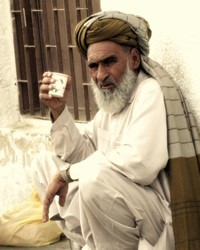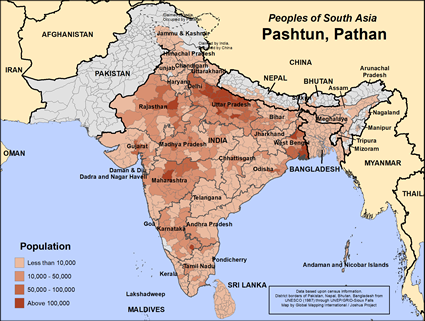The Pashtun of Afghanistan and Pakistan have been called the largest Muslim tribal society in the world. There are at least 30 major tribes, and countless sub-tribes and clans. Spread over a vast geographical area and riven by socio-economic, political, tribal and linguistic (dialectical) differences, Pashtuns nevertheless share a unique sense of common identity. Pashtun identity is based on four elements: Heritage (descent from a common ancestor); Islam (99.9% Muslim); the Pashtunwali Code of Honor ("The Way of the Pashtun"); and to some extent, Language (Pakhtu or Pashto). They live primarily in Afghanistan and Pakistan, though there is a significant Pashtun diaspora in the Arab Gulf and many Western countries.
There have been efforts to reach the Pashtun since 1818, when William Carey translated parts of the Old Testament into Pakhto, based on interaction with Pashtun traders who caravanned (and settled) across north India and beyond. (In South Asia, the name "Pashtun/Pakhtun" was anglicized to "Pathan"—a name immortalized in Rudyard Kipling's novels and British colonial history; today, the Pashtun in India, Bangladesh, and throughout South Asia are known as "Pathan".)
Pashtuns are a warrior people, and they have proven time and again that they will not be dominated by outsiders. The cost is living in a land where there is never peace or stability.
On-going violence has led to widespread disillusionment—and the migration of tens of thousands of Afghans (mainly young men) seeking jobs and opportunity in Europe and the West. A small number have migrated to Sri Lanka.
The younger generation is caught between parents who hold to Pashtun ways and their peers at school who live in a different world. There is little social interaction between the Buddhist Sri Lankans and the Muslim Pashtuns. Pashtuns share the same mosques with Sri Lankan Muslims.
No matter where they live, including Bangladesh, Pashtuns are Sunni Muslims. Blended in with their Islamic religion is Pashtunwali, their code of honor. Pashtuns highly value hospitality and a form of manliness that easily leads to violent conflicts.
Pashtun people need job opportunities. Often the best and the brightest manage to leave Afghanistan for countries with better economic prospects.
Pray for the production and distribution of all forms of media in the Pashto language, including literature, videos, music, movies, radio, websites and social media.
Pray for Bible translations to produce good fruit, and opportunities for people to respond to the Lord of lords.
Pray for loving workers to serve among the Pashtun people—in education, business, healthcare, development, and other professional areas.
Believers. No one knows how many Pashtuns are following Jesus. Seeds of the gospel have been sown widely. The greatest barriers to faith are social and cultural. Pray for God's Spirit to strengthen and protect new believers and to empower their lives and witness.
Scripture Prayers for the Pashtun, Pathan in Sri Lanka.
| Profile Source: Joshua Project |
| Other PDF Profile |











